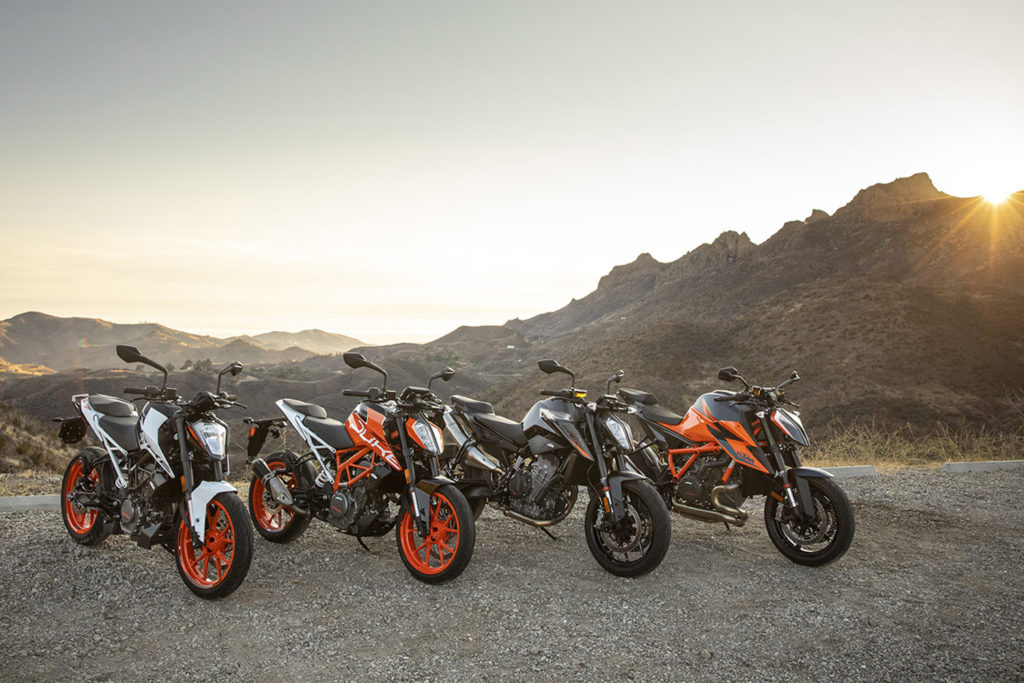
KTM rose to prominence with its competition-winning two-stroke dirtbikes, but in 1994 the Austrian manufacturer made its first foray into the four-stroke streetbike market with the 620 Duke. The original Duke arrived on the scene just as supermoto replicas were booming in popularity. The tall, powerful machines with wide bars, much like enduro bikes but running on 17-inch road tires, were a blast to ride. Packing 50 horses, the light and lithe 620 Duke was the most powerful thumper on the street at the time, earning it a hooligan reputation.
KTM has come a long way since then, but the early Duke DNA – wide bars, a tall stance, and exhilarating power – carries over to the current lineup. Every model – 200 Duke, 390 Duke, 890 Duke (an R model is also available), and 1290 Super Duke R (shown left to right above) – is a naked bike with an upright seating position and a wide, flat seat, and most are versatile enough for urban riding, canyon carving, and even sport-touring. With styling by Kiska, they share bold, angular bodywork and typically favor KTM’s trademark orange on powdercoated frames and bodywork. The split headlight on the three largest Dukes also split the opinion of our test riders.
What are the four Dukes like, and what sort of buyers will they appeal to? We rode them back-to-back to find out.
200 Duke: Scrappy Underdog
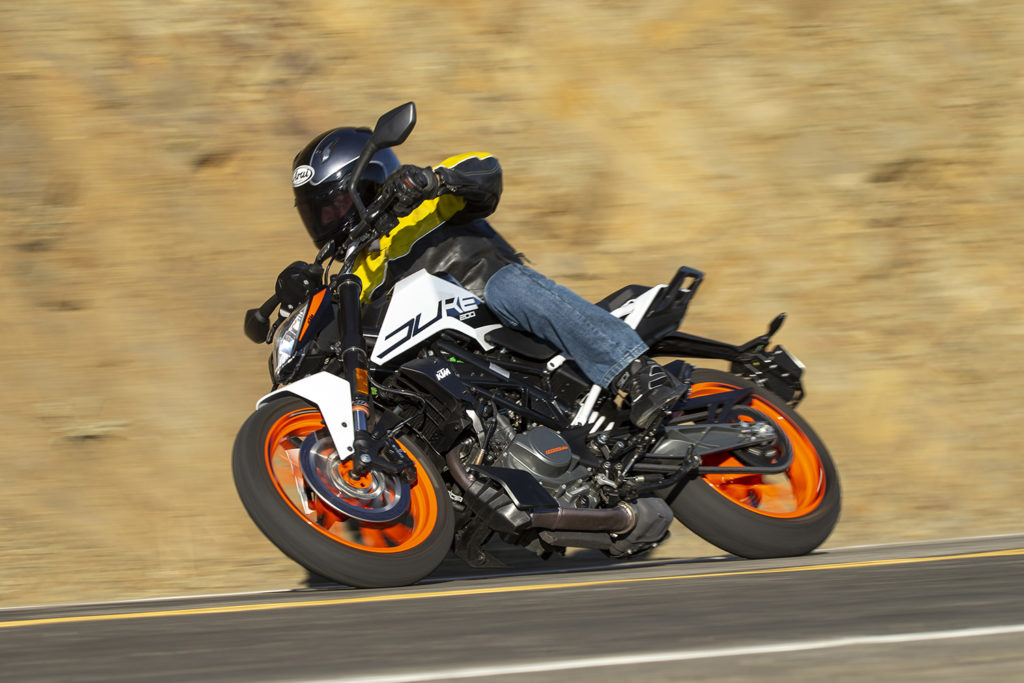
Though powered by a 200cc Single that made just 22 horsepower and 13 lb-ft of torque at the rear wheel on Jett Tuning’s dyno, the 200 Duke is more substantial than the numbers suggest and didn’t appear out of place among its larger siblings. It has the same physical dimensions and 3.5-gallon tank as the 390, but weighs 20 pounds less and its seat is an inch lower. Like all of the Dukes, the 200 has a chromoly tubular-steel trellis frame, and our test bike had a black main frame, a white subframe, and orange wheels.
Suspension is proficiently handled by a non-adjustable WP Apex inverted fork and a preload-adjustable rear shock. Single-disc brakes front and rear include Bybre (an abbreviation of “by Brembo,” a subsidiary focused on smaller machines) calipers, and ABS is standard and can be disabled at the rear wheel. The monochrome LCD instrument panel looks dated, and the one on our test bike needed to be unplugged and reset to fix a glitch. The 200 is the only Duke with a non-LED headlight and the only one that doesn’t have the split design.
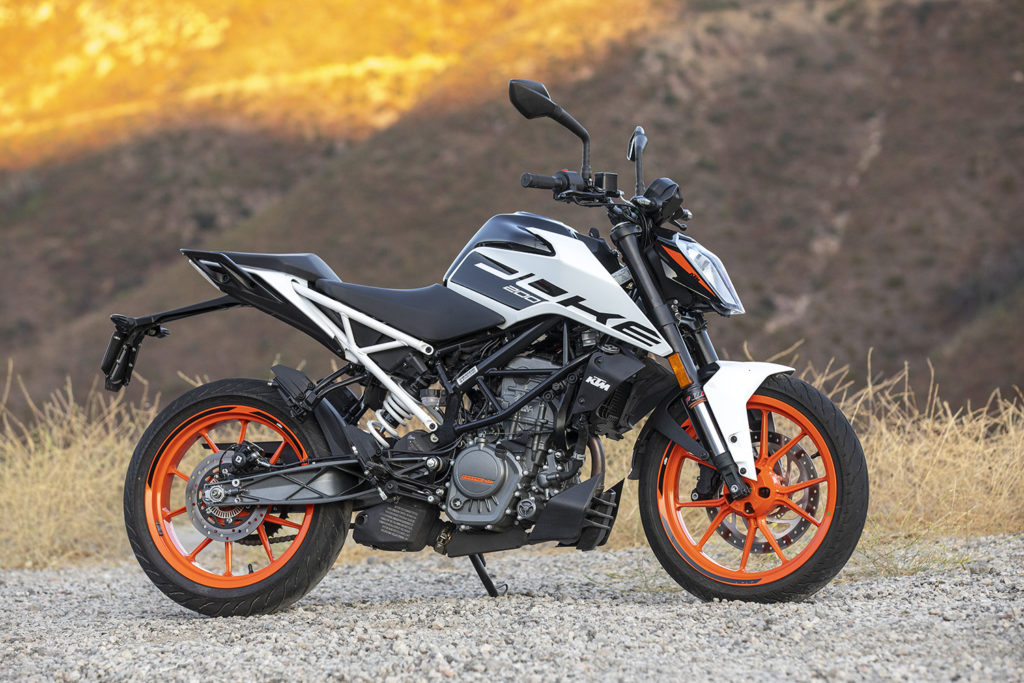
It’s only natural to label the 200 as an entry-level bike, and it’s well-suited for that role with unintimidating power and brakes that aren’t grabby and won’t easily lock up. With a flat torque curve and six gears, the 200 is more than capable of cruising at over 70 mph on the freeway, with a top speed approaching 85 mph. The chassis and suspension are well matched, and the 200 is light and exceptionally agile, making it exciting on curvy roads. At full tilt, the brakes could do with more muscle, and aggressive or larger riders will yearn for more power, especially going uphill. Our testing team was unanimous in concluding that the 200 exceeded expectations, especially on the fun scale.
The 200 is a perfect first motorcycle, and it offers more performance than entry-level bikes like the Honda Grom (see test on page 58) and the Royal Enfield Meteor 350. But new riders may outgrow the 200 quickly and trade up to – or even start off with – the 390.
390 Duke: Fierce Featherweight
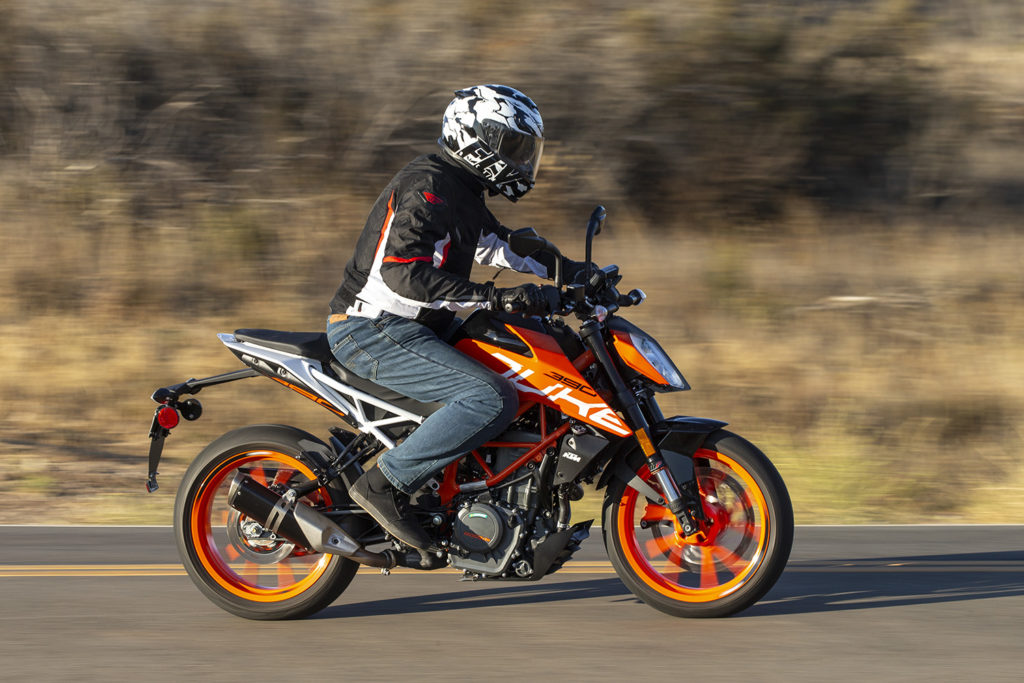
The 390 is a considerable step up from the 200, and the extra $1,700 is worth the investment. Despite its small size, the 390 is a rider’s motorcycle. Its 373cc Single pumps out 42 horsepower and 27 lb-ft of torque at the rear wheel. The suspension and brakes have a similar specification as the 200, but the fork and shock have about an inch more travel and feel better damped, and with its larger front rotor (320mm vs. 300) the 390’s brakes feel stronger and more precise. An LED headlight, a color TFT display with Bluetooth connectivity, and adjustable levers are welcome upgrades over the 200.
The 390 Duke is a blast to ride and punches well above its weight class. Tipping the scales at just 359 pounds wet and offering outstanding maneuverability and usable performance, the 390 will appeal to a broad spectrum of riders and was universally loved by our testers. Despite its power deficit, the 390 was able to keep up with the larger Dukes on tight, twisty sections of road, only falling behind when the pavement straightened out.
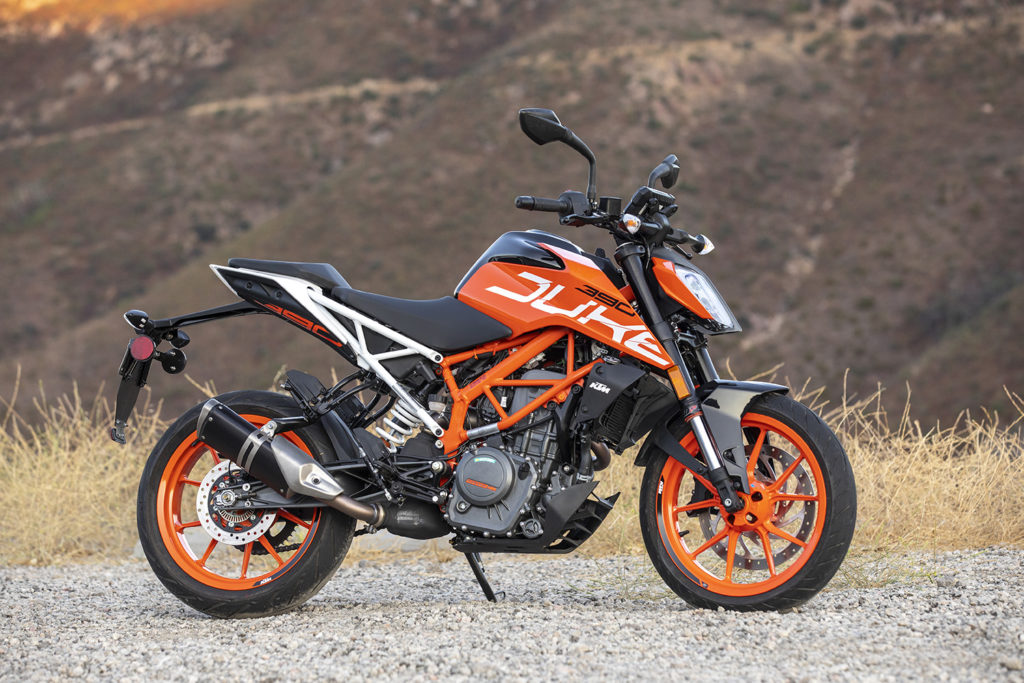
New riders, including those who want to go fast, will have years of enjoyment ahead of them on the 390 Duke. This is the sleeper bike, the one that might get overlooked by seasoned riders but packs a ton of fun into a small, affordable package. It can be a carefree, fuel-efficient commuter during the week, and on weekends it’s just a throttle twist away from being a canyon-carving dragon slayer.
890 Duke: Super Middleweight
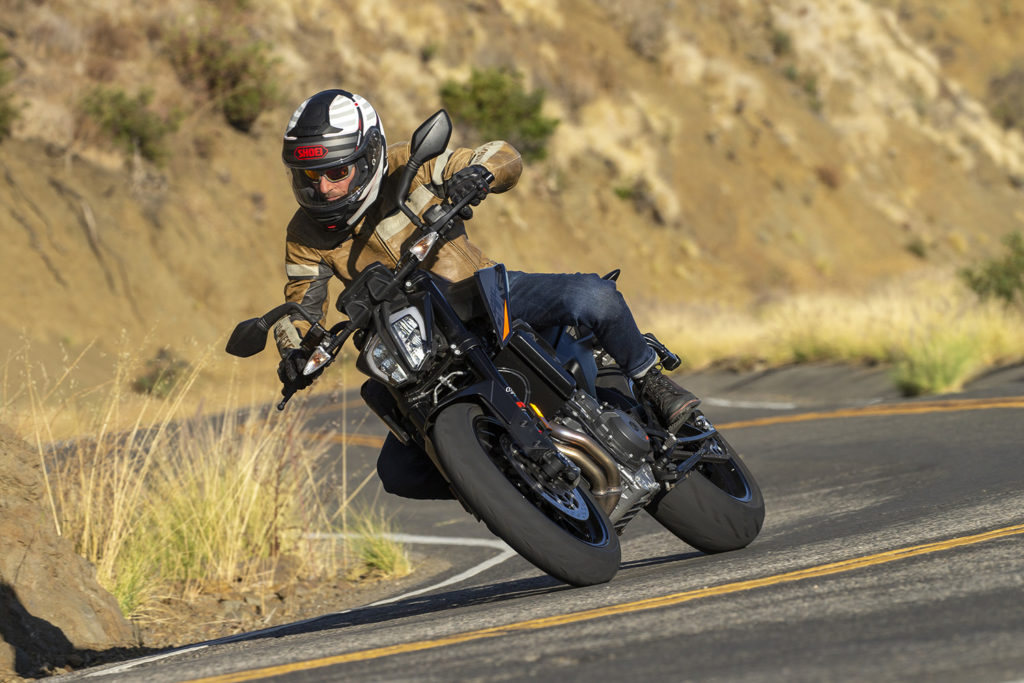
Nicknamed the “Scalpel,” the 890 Duke hews closest to the original Duke formula: light, agile, and capable of hair-on-fire thrills. Its 889cc parallel-Twin is good for 111 horsepower and 67 lb-ft of torque at the rear wheel in a bike that weighs just 405 pounds wet. Compared to the 390, you get 164% more power and just 13% more weight, but you’ll pay nearly twice as much in the bargain.
That’s a big jump in price, but everything is better. The WP Apex suspension, with a non-adjustable inverted fork and a preload-adjustable rear shock, offers better damping and more travel. (The 890 Duke R is equipped with higher-spec adjustable suspension.) The triple-disc brakes with multi-mode cornering ABS are precise and reassuring. It also has riding modes, multi-level traction control, and wheelie control, allowing our testers to tailor the riding experience as desired. Our test bike was fitted with the dealer-installed Tech Pack ($750), which includes the Track Pack (Track mode, 9-level TC, anti-wheelie off, and launch control), Motor Slip Regulation, and up/down Quickshifter+.
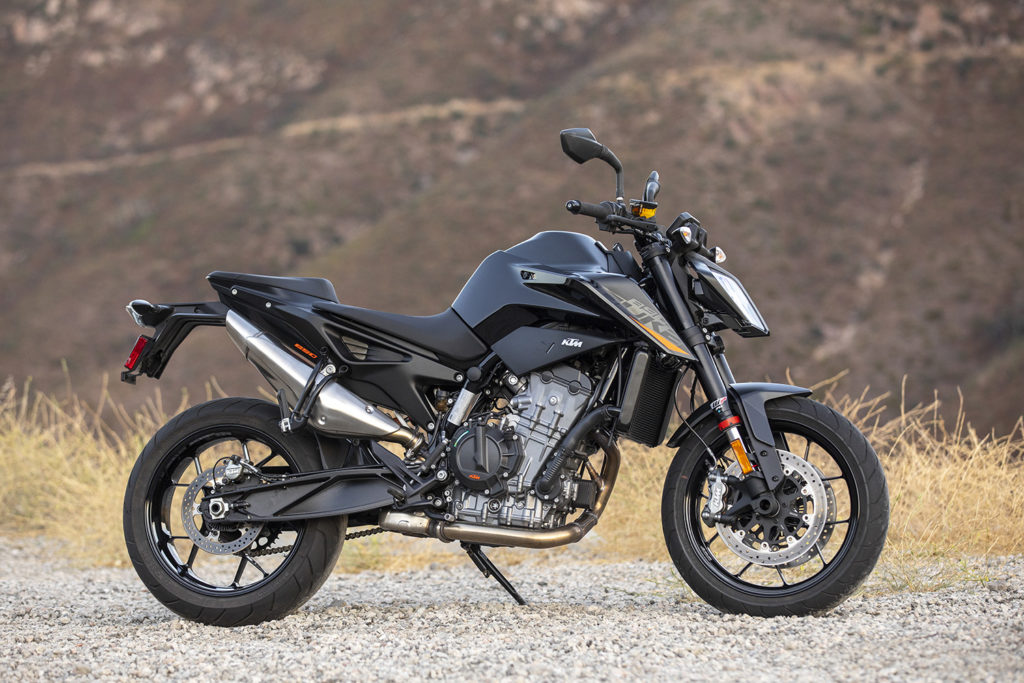
None of us were immune to the 890’s charms. We praised its dart-like handling, eager yet smooth power delivery, strong, progressive brakes, and sure-footed chassis. The Twin’s 270-degree firing order delivers a broad spread of torque for blasting out of corners and adds a pleasing crackle on downshifts. The 890 is a standout machine that encourages you to test its handling and your nerve, and it consistently rewards the rider with confidence-inspiring feel and agility or a gentle prod where lesser machines fall short.
The 890 is no show pony. It is a mustang, wild at heart, straining at the bit, and embodies the essence of the Duke series: immediate power and razor-sharp cornering stripped down to the barest of essentials. When it comes to performance and handling, nothing is superfluous in the 890, and nothing is wanting. Experienced riders with even the slightest inclination toward spirited riding will never tire of putting the 890 Duke through its paces, and yet it remains friendly and forgiving enough for jaunts around the city or sport-touring with some soft luggage. Just point it at the twistiest road you can find and open the throttle.
1290 Super Duke R: When Too Much is Not Enough
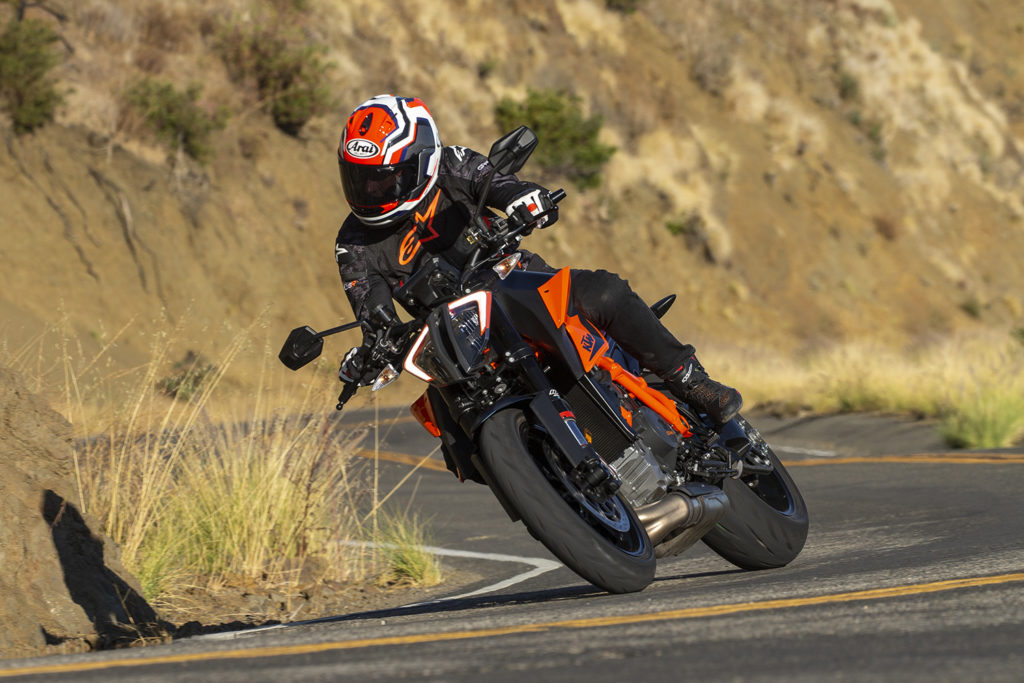
Introduced in 2014, the 1290 Super Duke R – known as “The Beast” – is the pointy end of KTM’s streetbike spear. Updated last year, it’s more powerful and lighter than ever, with its 1,301cc V-Twin churning out an asphalt-buckling 166 horsepower and 94 lb-ft of torque at the rear wheel.
Fully adjustable WP Apex suspension is tuned to handle the Super Duke’s immense power, and it delivers a firm but confident ride. Brembo Stylema front brake calipers feel like they came off an airliner, such is their awesome strength, and while some in the test group felt they had too much initial bite, others raved about them. Riding modes and a full suite of six-axis IMU-enabled electronic riding aids allow The Beast to be tamed or unleashed, and our test bike was equipped with the dealer-installed Tech Pack ($750). The LED headlight incorporates an air intake, but overall styling remains much the same – angular, aggressive, looking for a fight. Creature comforts include self-canceling turnsignals, cruise control, and keyless ignition, steering lock, and gas cap.
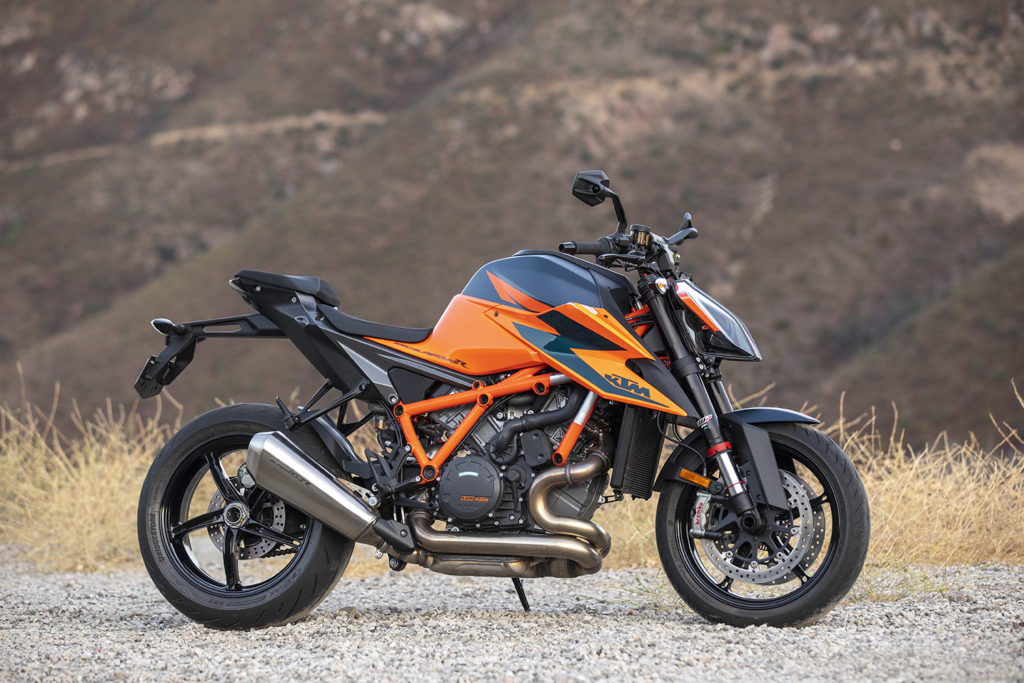
The Super Duke elicited the most controversy when it came to the post-riding discussions. Like a silver-backed gorilla, it packs serious punch, but if you treat the 1290 with respect, it will respond in kind. The ocean of torque allows for lazy meandering along open roads, as well as controlled spurts of acceleration and braking demanded by dense traffic. But should you decide to be aggressive with the Super Duke, be sure to have your senses, skills, and reactions at peak readiness, as it comes by its Beast moniker honestly.
The bike feels tall and, with its humpback tank, a little imposing, but its 441-pound curb weight is quite manageable. Although the steering is heavier than on the 890 due to its lazier rake and slightly longer wheelbase, the 1290 is nonetheless nimble and responsive. For a couple of our testers, the difference was partly psychological. Whereas the 890 felt in alignment with their skill set, the 1290’s capabilities felt beyond them. Part of the excitement of riding a motorcycle is the ability to give it full throttle, but doing so on the 1290 is short-lived at best and more appropriate for wide-open roads or even the racetrack.
When considering potential owners for this exceptional machine, it is best suited for those with a high level of riding skills and experience. Some buyers just want the best, or the most, or both, and the 1290 Super Duke R will deliver on those promises. This horse will carry like a Clydesdale and run like a thoroughbred. Beyond that, the KTM 1290 Super Duke R defies reason, in the sense that it offers almost too much of everything, which you could argue is precisely what a Super Duke should do. For most riders, however, the 890 is probably a better fit and will be more enjoyable to ride. Like Dirty Harry said, riders must know their limitations.
All in the Family
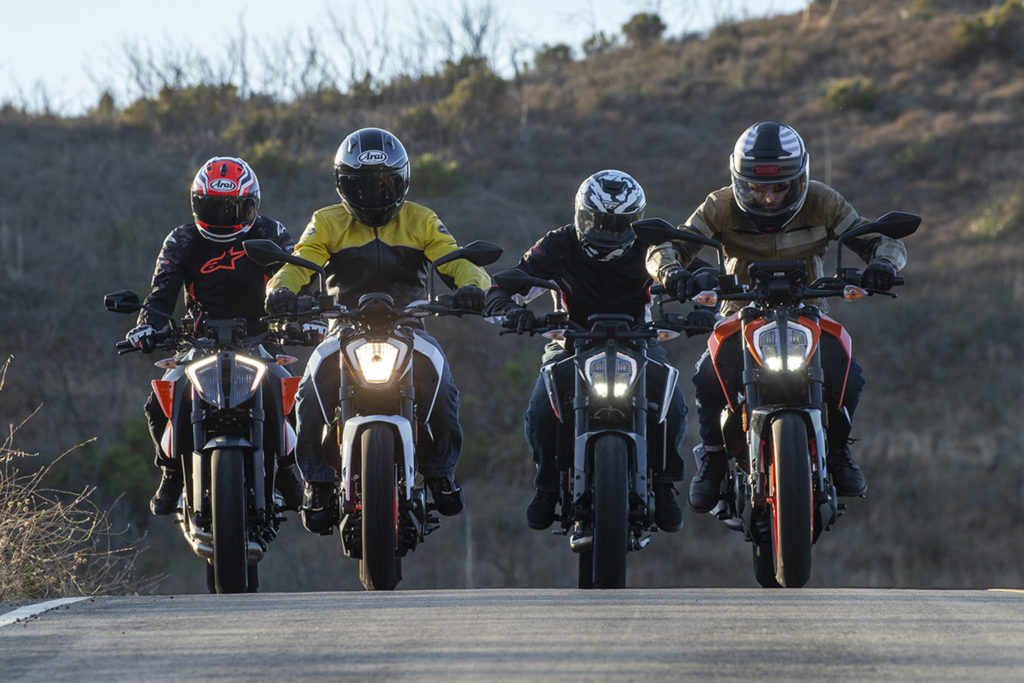
Within the KTM Duke range, from the $3,999 200 Duke to the $18,699 1290 Super Duke R, there is a bike for nearly every rider, from those just starting out to those at the top of their game, from commuters to weekend warriors to track-day junkies. While only the 200 and 390 are likely to be cross-shopped by potential buyers, we found the 390 and 890 to be the most broadly appealing of the four. For experienced riders, the 200 may be too little, and for some, the 1290 may be out of reach, but every bike here earned the respect of our testing team.
2021 KTM Duke Lineup Specs
2021 KTM 200 Duke Specs
Base Price: $3,999
Warranty: 2 yrs., 24,000 miles
Website: ktm.com
Engine
Type: Liquid-cooled, transverse Single, DOHC w/ 4 valves
Displacement: 200cc
Bore x Stroke: 72.0 x 49.0mm
Compression Ratio: 11.5:1
Valve Insp. Interval: 9,300 miles
Fuel Delivery: EFI, 38mm throttle body
Lubrication System: Wet sump, 1.6 qt. cap.
Transmission: 6-speed, cable-actuated wet clutch
Final Drive: X-ring chain
Chassis
Frame: Chromoly steel trellis & cast aluminum swingarm
Wheelbase: 53.4 in. ± 0.6 in.
Rake/Trail: 25 degrees/3.7 in.
Seat Height: 31.6 in.
Suspension, Front: 43mm inv. fork, no adj., 4.6 in. travel
Rear: Single shock, adj. preload, 5.0 in. travel
Brakes, Front: Single 300mm disc w/ radial 4-piston caliper & ABS
Rear: Single 230mm disc w/ 1-piston caliper & ABS
Wheels, Front: Cast aluminum, 3.00 x 17 in.
Rear: Cast aluminum, 4.00 x 17 in.
Tires, Front: 110/70-ZR17
Rear: 150/60-ZR17 Wet Weight: 339 lbs.
Performance
Horsepower: 22 hp @ 10,000 rpm (rear-wheel dyno)
Torque: 13 lb-ft @ 7,900 rpm (rear-wheel dyno)
Fuel Capacity: 3.5 gals.
Fuel Consumption: 68 mpg
Estimated Range: 238 miles
2021 KTM 390 Duke Specs
Base Price: $5,699
Warranty: 2 yrs., 24,000 miles
Website: ktm.com
Engine
Type: Liquid-cooled, transverse Single, DOHC w/ 4 valves
Displacement: 373cc
Bore x Stroke: 89.0 x 60.0mm
Compression Ratio: 12.6:1
Valve Insp. Interval: 9,300 miles
Fuel Delivery: EFI, 46mm throttle body
Lubrication System: Wet sump, 1.8 qt. cap.
Transmission: 6-speed, cable-actuated slip/assist wet clutch
Final Drive: X-ring chain
Chassis
Frame: Chromoly steel trellis & cast aluminum swingarm
Wheelbase: 53.4 in. ± 0.6 in.
Rake/Trail: 25 degrees/3.7 in.
Seat Height: 32.7 in
Suspension, Front: 43mm inv. fork, no adj., 5.6 in. travel
Rear: Single shock, adj. preload, 5.9 in. travel
Brakes, Front: Single 320mm disc w/ radial 4-piston caliper & ABS
Rear: Single 230mm disc w/ 1-piston caliper & ABS Wheels, Front: Cast aluminum, 3.00 x 17 in.
Rear: Cast aluminum, 4.00 x 17 in.
Tires, Front: 110/70-ZR17
Rear: 150/60-ZR17 Wet Weight: 359 lbs.
Performance
Horsepower: 42 hp @ 8,800 rpm (rear-wheel dyno)
Torque: 27 lb-ft @ 7,000 rpm (rear-wheel dyno)
Fuel Capacity: 3.5 gals.
Fuel Consumption: 56 mpg
Estimated Range: 196 miles
2021 890 Duke Specs
Base Price: $10,999
Warranty: 2 yrs., 24,000 miles
Website: ktm.com
Engine
Type: Liquid-cooled, transverse parallel-Twin, DOHC w/ 4 valves per cyl.
Displacement: 889cc
Bore x Stroke: 90.7 x 68.8mm
Compression Ratio: 13.5:1
Valve Insp. Interval: 18,600 miles
Fuel Delivery: EFI, 46mm throttle body x 2
Lubrication System: Semi-dry sump, 3.0 qt. cap.
Transmission: 6-speed, cable-actuated slip/assist wet clutch
Final Drive: X-ring chain
Chassis
Frame: Chromoly steel trellis & cast aluminum swingarm
Wheelbase: 58.3 in. ± 0.6 in.
Rake/Trail: 24.3 degrees/3.9 in.
Seat Height: 32.8 in.
Suspension, Front: 43mm inv. fork, no adj., 5.5 in. travel
Rear: Single shock, adj. preload, 5.9 in. travel
Brakes, Front: Dual 300mm discs, w/ radial 4-piston monoblock calipers & ABS
Rear: Single 240mm disc w/ 2-piston caliper & ABS
Wheels, Front: Cast aluminum, 3.50 × 17 in.
Rear: Cast aluminum, 5.50 × 17 in.
Tires, Front: 120/70-ZR17
Rear: 180/55-ZR17
Wet Weight: 405 lbs.
Performance
Horsepower: 111 hp @ 9,500 rpm (rear-wheel dyno)
Torque: 67 lb-ft @ 7,000 rpm (rear-wheel dyno)
Fuel Capacity: 3.7 gals.
Fuel Consumption: 44 mpg
Estimated Range: 163 miles
2021 KTM 1290 Super Duke R Specs
Base Price: $18,699
Warranty: 1 yr., 12,000 miles
Website: ktm.com
Engine
Type: Liquid-cooled, transverse 75-degree V-Twin, DOHC w/ 4 valves per cyl.
Displacement: 1,301cc
Bore x Stroke: 108.0 x 71.0mm
Compression Ratio: 13.5:1
Valve Insp. Interval: 18,600 miles
Fuel Delivery: EFI, 56mm throttle body x 2
Lubrication System: Dry sump, 3.7 qt. cap.
Transmission: 6-speed, hydraulically actuated slip/assist wet clutch
Final Drive: X-ring chain
Chassis
Frame: Chromoly steel trellis & c/a single-sided swingarm
Wheelbase: 58.9 in. ± 0.6 in.
Rake/Trail: 25.2 degrees/3.9 in.
Seat Height: 32.8 in.
Suspension, Front: 48mm inv. fork, fully adj., 4.9 in. travel
Rear: Single shock, fully adj., 6.1 in. travel
Brakes, Front: Dual 320mm discs w/ radial 4-piston monoblock calipers & ABS
Rear: Single 240mm disc w/ 2-piston caliper & ABS
Wheels, Front: Cast aluminum, 3.50 × 17 in.
Rear: Cast aluminum, 6.00 x 17 in.
Tires, Front: 120/70-ZR17
Rear: 190/55-ZR17
Wet Weight: 441 lbs.
Performance
Horsepower: 166 hp @ 10,100 rpm (rear-wheel dyno)
Torque: 94.1 lb-ft @ 8,300 rpm (rear-wheel dyno)
Fuel Capacity: 4.2 gals.
Fuel Consumption: 38 mpg
Estimated Range: 196 miles
The LCD on the 200 (top left) falls short of the full-color TFTs on the larger Dukes, which provide clear, readable information, with a tach, speedo, gear position, and more. In low light, the displays change from a white background (shown on the 390) to black (shown on the 890) or orange (only on the 1290).







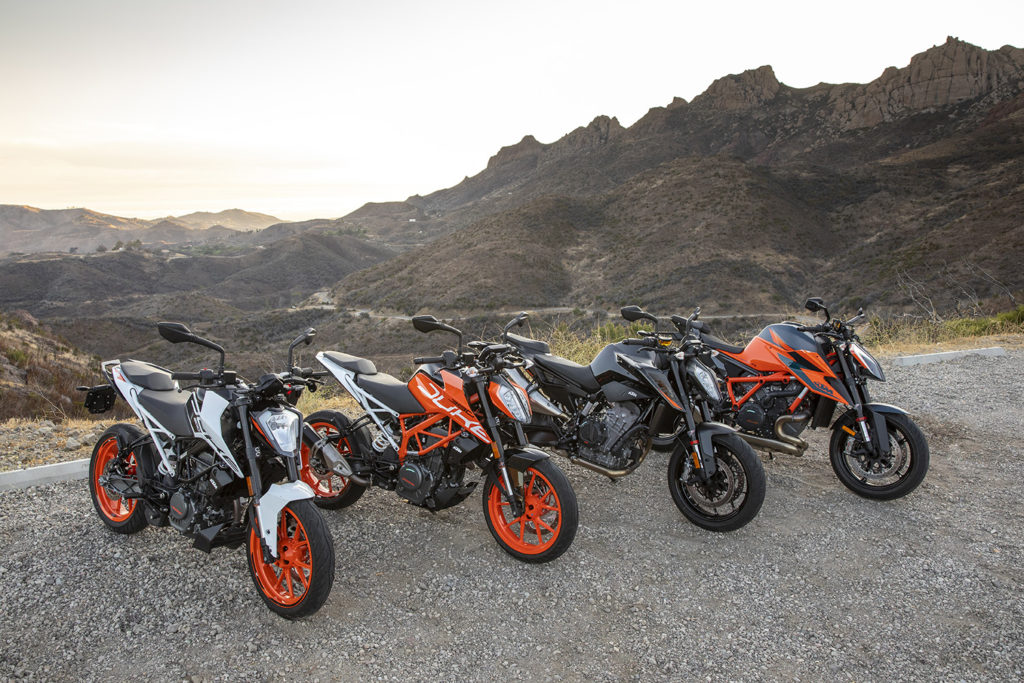

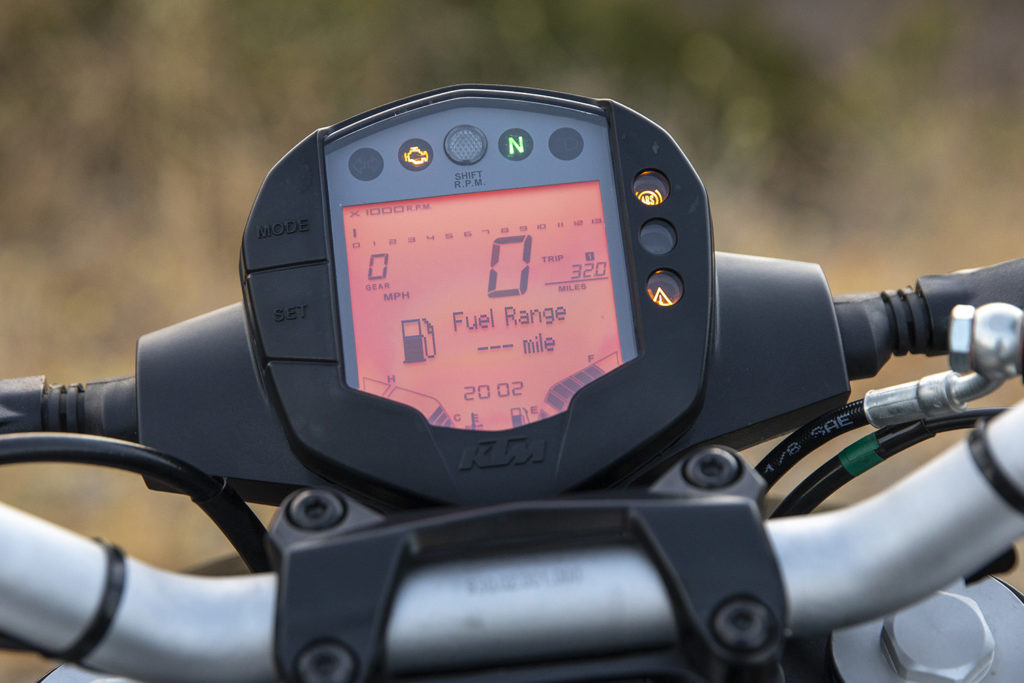
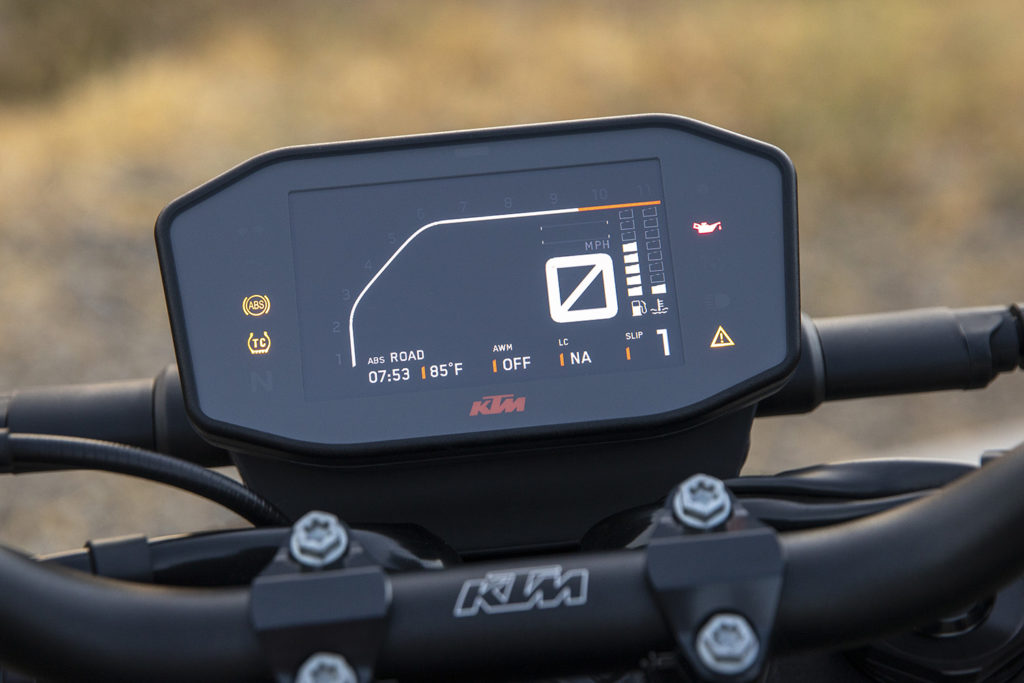
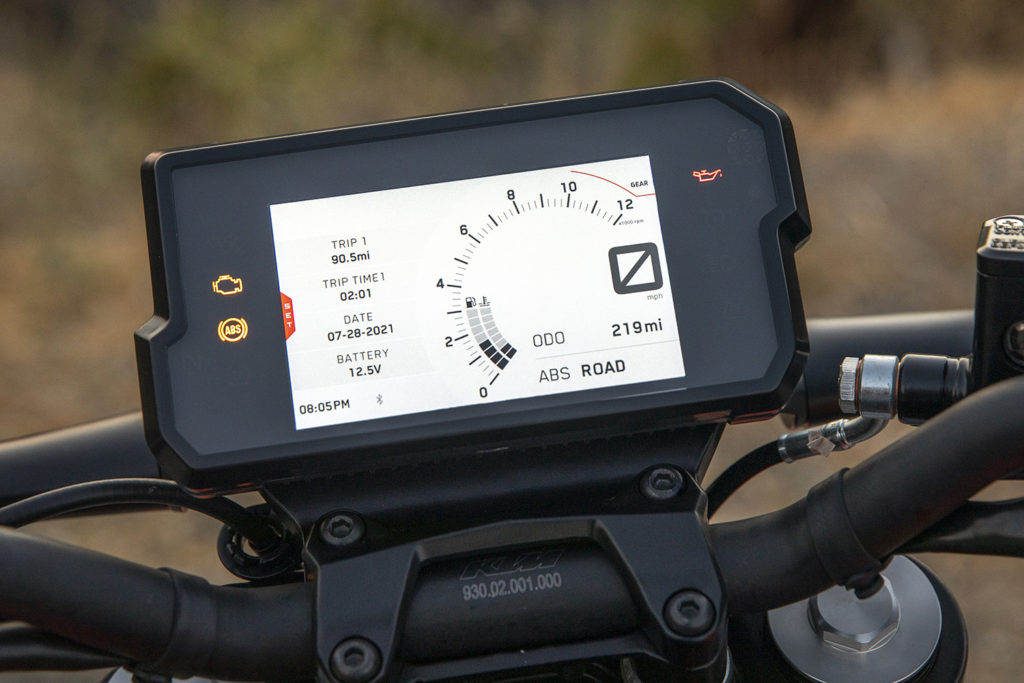
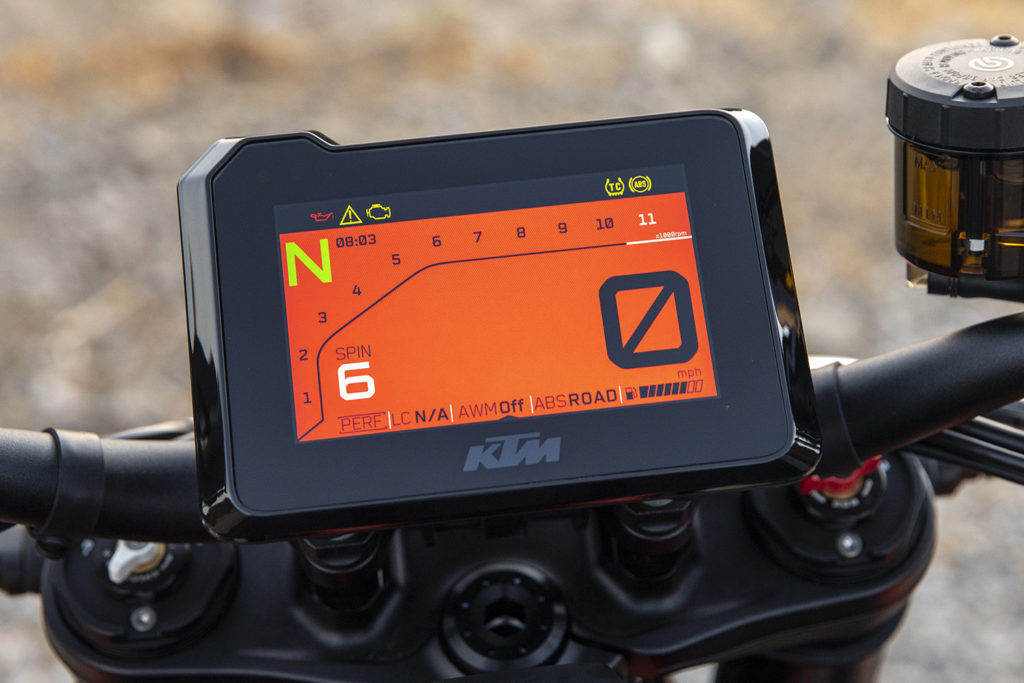
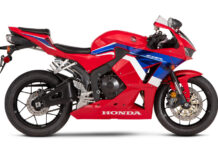
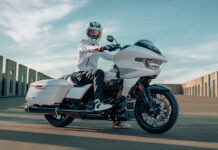
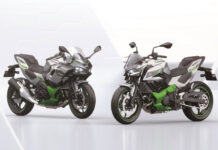

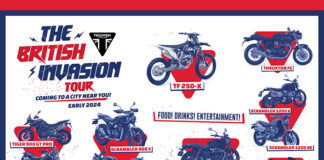
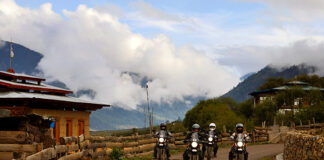

When the 200 was announced I was skeptical of if it was really needed, but I think it has a place in the market. Glad to see KTM offering all of these versions.
Where is the KTM 1290 Super Duke GT in this report? You owe it to readers to report what if anything you know about the status of that bike in KTM’s lineup. The 2021 version has not been available in the U.S., at least not widely, and that has left many mystified with no clear answers. As a 1290 GT owner I’m pretty disappointed by the conspicuous absence of that exceptional sport tourer in this Rider report.
We’re big fans of the 1290 Super Duke GT, as our previous tests indicate (links below). For this particular test, we wanted to compare the naked bike lineup, from smallest to largest. With its windscreen, saddlebags, and other touring features, the GT is in a different segment.
https://ridermagazine.com/2019/12/23/2019-ktm-1290-super-duke-gt-first-ride-review/
https://ridermagazine.com/2017/05/02/2017-ktm-super-duke-gt-long-term-review/
Well hmm, the story doesn’t say it’s a comparo of Duke naked bikes only. It’s sort of mentioned in a caption, but that doesn’t count. IMHO the GT model bore at least a mention, at least to explain its exclusion. Thanks, carry on.
After searching months for the right bike I got the Duke 200.
The Duke 200 really feels like a “big bike” and give you a lot of fun, sure you have to play a lot with the gear box, but it’s part of the fun !
The torque and power are there, always available giving the bike a “safe riding” feeling.
I love the fact that the exhaust is under the engine and does not “cook” my right leg.
It’s the perfect bike for a single person with a “normal” weight.
I replaced the original ugly rear fender with a short one made by T-Rex Racing, giving the bike a much cooler look !
I also took away the passenger rear foot holders as I am the only one riding the bike.
The engine is very efficient and help me save me a lot in gas (I use ethanol free gas).